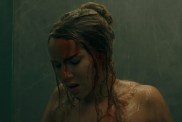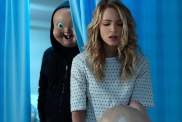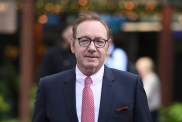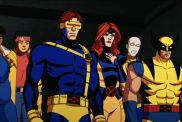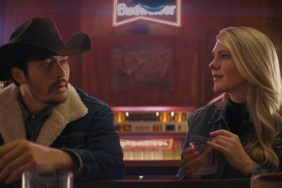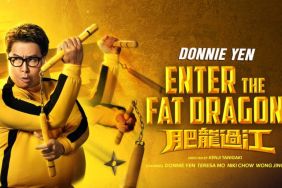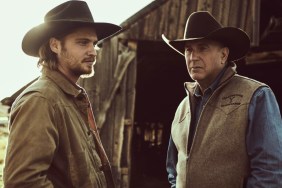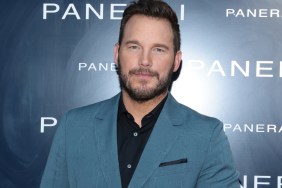Eventually, director Adam McKay got a break in shooting the same scene over and over and he came over to talk with us along with the film’s co-writer Chris Henchy. Although we got a pretty clear idea how they liked to work from watching them rehearsing and filming, they got a bit more in-depth into how their system of improvisation works and how they decide what’s worth keeping.
Q: Were there any classic buddy cop movies that you guys were inspired by?
Chris Henchy: What did we watch? We kind of looked at them all.
Adam McKay: But the idea, I guess it came out of it in a sense that we were always saying that there hadn’t been one in a while. They kind of went into Hollywood jail for a little bit, ran out of gas, and we sort of liked the idea that we hadn’t seen one in a long time. We also liked the idea that with crime, like with Madoff stealing 70 billion dollars, the idea of “What is crime anymore?” The idea of busting drugdealers is almost quaint at this point, we sort of liked that, too. But I’m trying to think what else did we watch?
Henchy: Yeah, we went back, like “Freebie and the Bean,” even looking at “French Connection” and those kinds of partnerships and then all the big ones from the ’80s, the “Lethal Weapons” and yeah, it was interesting going back… we hadn’t watched them in a while, but they definitely had a style of their own back then.
McKay: We were shocked at “French Connection,” which I’d seen a couple of time but I hadn’t seen in a bunch of years. God, that’s still a really good movie, just the way it’s shot is so fantastic. We looked at some of Lumet’s stuff, too, as far as how he shoots New York ’cause I sort of love that ’70s look of New York. Browns are sort of highlighted and that slightly dirty feeling we love. Now it’s actually pretty clean compared to the ’70s now, but we sort of liked that look. But “Freebie and the Bean” is a really good one and “French Connection,” those were two big ones.
Q: There had been so many police comedies over the years, so what did you think you could bring to it? You’d think that most of the funny jokes had been used already. Where there more places you could go with it?
McKay: I’m not sure. As far as cop comedy, it’s been awhile. The “Police Academy” stuff was all hyper-slapsticky. We certainly can do slapsticky but in a different way.
Henchy: I think if you go to the “Lethal Weapons” they were all sort of heightened and so confident about everything they were doing and able to do. That’s one thing we went against, is the confidence in the sense….
McKay: Yeah, you know what? I guess the truth is that the idea didn’t come from, “Let’s do a cop buddy movie.” The idea came from the “other guy” idea, the idea that there’s these superstar cops that die or there’s an accident, whatever, and then you have to have these other guys come in. We just liked the idea that it was the background guys from a cop movie that become the stars. That’s really where it came from, and the next step was, “Oh, I guess we’re doing a cop buddy film” and then kind of looking at that. But we didn’t feel crowded by much comedy. Really, the two big ones are Zucker, Zucker and Abrams’ TV show “Police Squad!” I used to love that show it was a great show, and then the “Police Academy” things but those are so heightened and so large, they didn’t really bump with us at all. And then otherwise, what’s really nice about the cop genre is it’s a genre that’s so exhausted that it puts the emphasis on character. “Barney Miller” is one of my favorite all-time shows and it was almost incidental that it was a cop show at that point. It’s sort of like doing a job interview sketch, and I sort of like job interview sketches because there are so many of them that the emphasis is not on the premise, it’s more on what you do with it. In that way, it was oddly freeing. We were kind of able to do whatever we wanted with it.
Q: At what point did you start writing the part for Mark?
Henchy: We went into this project with Mark and Will attached so Mark and Will had lunch and Ad and I had an idea, and we went and had lunch and hung out and then went and pitched it with Mark and Will and just jumped on his eagerness and how funny he is. He’s been fantastic in this.
Q: Are you trying to create funny lines for Eva and Michael considering they don’t have the funny bones of the rest of the cast?
Henchy: Michael Keaton’s very funny. You can go back to “Night Shift” and “Mr. Mom.” We loved that he has a great personality and with Mendes we have such a funny storyline for her that it’s going back to that character stuff, she’s just really funny reacting to her character, which is she’s incredibly hot but Will doesn’t acknowledge it. He has no idea how hot she is, so it just gave her a great place to play, so her lines, as easy as they may seem, her point of view made them really funny and how eager she was trying to break through to Will.
Q: Will said that working on your set you allow a lot of open ideas and you want to hear from everybody. Is there anything sacrosanct that you take from the script that you say, ” No matter what we do, we have to film it this certain way and this has to be in the scene for comedic purpose”?
McKay: Is there anything like that?
Henchy: I don’t think anything… There’s certainly story points you have to hit, but I don’t think Adam or myself are precious about anything, just whatever has gone on in that scene that these guys bring and we encourage everybody to have these “alts” and if there’s a funnier line, that’s going to get noticed and stay in the script and stay in the movie.
McKay: In filming, too… once you shoot it, you have shot it and then you can shoot it again and do different stuff, so no, I’d say there is never anything we wouldn’t try an alt on. We always get the “as written” every single time ’cause we know we at least have that, and then you can see what’s going on with this. We’re just starting to play with it at the end. It keeps getting bigger and bigger and we keep finding stuff every time so that’s usually what happens, so the answer is “yes and no.” We shoot everything as written and then we change every single line.
Henchy: You want to make sure we get the story points that you don’t find yourself in the edit room missing a big crucial moment in the story.
McKay: We try and get three different versions of the story point, then you try to get a version where you can edit around a chunk if you end up cutting it, ’cause that’s the worst when you want to cut something and you can’t cut it, so there will always be one where “if we cut all this, we go from here to here, what will be a line to do this?” You try and get those. Sometimes they’re rickety when you shoot them but when you’re in the edit room, you’re like “Thank God I have this.” The weirdest little connective piece.
Q: What percentage of improv do you think winds up in the final movie?
McKay: People always ask us that. I think it’s like 25%, 20%, that’s about right, but it does more than just the actual words because it also makes the actors looser, so what you’re getting is more personalized reads out of people. We produced that movie “The Goods” and they improvised on it, but they didn’t do it to the degree we like to do it. There was a lot of times where they would just do the as-written, and I notice that the reads are different. When you see movies that are word-for-word, it tends to be almost be more stylized kind of leaning towards Mamet, whereas when you get people improvising, it just has a flow and rhythm to it, and that allows you to be stylized about other stuff, which is good.
Q: The stuff that Rob Riggle is doing with his partner, is that something in the movie that’s a recurring thing or is that just something going on today?
McKay: No, this is new. I mean, they have this ambitious partnership where they want to be the next star cops that keeps heightening and heightening, so it makes sense that this would be the next step, that it would get weird, but no, I didn’t know anything about that until they start doing it.
Henchy: But then the big reactions to the “shooting Derek Jeter but you didn’t have a big shot glass,” the big laugh? That’s something they discovered a few weeks ago shooting and coming in with a stupid joke and really going overboard with the laughter and we said, “It’s great, let’s keep doing that.” So they reprised it here. That’s stuff they found there that continues to go through the rest of the script. When we’re in the school in the scene when they’re talking to the kids, we threw a line in, “Oh, grab a girl and say, ‘Who wants to go on a ridealong?'” and this girl raises her hand and this 8-year-old girl going on this crazy shoot-out ride-along and we go, “Oh, that’s a funny joke” but something that happened on the spot there was never in the script is playing in three more scenes.
McKay: So we have this 8-year-old girl in every single set-up and it made us laugh too much so we always do one take with the 8-year-old girl. (laughter)
Henchy: She’s just standing in the background.
McKay: I don’t know if it will stay in but it sure makes us laugh.
Henchy: But she had a good time. From doing one afternoon…
McKay: She had a terrible time. She was scared and we put her in some very unsafe situations, but don’t put that in… no, no. She had the best time.
Q: Can you talk about the action scenes? Will and Mark said there were a lot of big action scenes, so are they going to be over the top on purpose or are they going to be normal big Hollywood blockbuster type stuff.
McKay: We’ll see how it turns out and then I’ll claim whatever makes us look the best so if it’s shitty and over the top, I’ll say “Oh, yeah, it’s the Sam Raimi joke” and if it’s really really good, we always meant that. No, no. You can sort of compare it to what we did with “Talladega Nights” where we did the race scenes and we said, “We can’t do joke race scenes. We gotta make them look as cool as we possibly can,” and then cut them to the point where they never get boring, hopefully, and that’s what we’re doing with this. No, the action stuff we’re shooting as best we possibly can, but you know, the writing that goes through it is different, so some of the action chunks are a little odd or off, but then in the execution, we do them like we’re shooting “Bourne.” We have a lot of people from the “Bourne” (movies)… we have our producer Pat McCrowley and obviously Oliver Wood shot all of it, so it’s actually fantastic, but you can literally say, “Well, how would you do this in Bourne?” and you’d get kind of some ideas to get going. Dare I say, there are actually a couple scenes that look kick-ass. We shot a giant shoot-out in a conference room that looked kind of amazing, actually.
Henchy: The car going through a bus.
McKay: The car going through a bus is really cool.
Henchy: The double-decker and into a building.
McKay: Yeah, there’s some cool sh*t.
Henchy: There’s some big stuff.
Q: Any “French Connection” riffs or references to try and tie it together?
McKay: Well, you know it’s funny, “French Connection” when did it come out? ’73, something like that? It’s been so ripped apart and cannibalized so no, I would say there’s no direct references, but in a weird way, every cop buddy movie reference is that, but the look of it was really important and the pacing and the feel. We just watched it a bunch of times. It’s one of those ones that you want to kind of let it rub off on you. You don’t want to directly bite from it.
Q: Did you try to make it look very different from your other movies or make it look like one of those movies?
McKay: Yeah, yeah. I mean, the nice thing and we discovered it pretty quickly is that we talked about a different look, of course. You know what’s odd? The movie we watched was “Michael Clayton” because we kept talking about this Bernie Madoff financial thing going on, and it’s going to be the anti-“Drugdealers!” or “Smugglers!” or “Kidnappers!” that kind of thing. We wanted it to be a sophisticated, boring jeopardy plot that we then make interesting, so “Michael Clayton” was another one we looked at so we wanted a sophisticated… what was the other one? “The International” we looked at, just trying to find that right gauge, but as soon as we started shooting, we realized that New York dictates your look. If you shoot in New York then New York is your look, so from that sort of base and the coloration of New York we then started tweaking it, playing with it. Yeah, it’s just by virtue of shooting in New York, it’s easily the best-looking film we’ve shot, there’s no question about it.
Q: Can you talk about some of the best and worst parts about shooting exteriors here in New York? Will kind of touched upon it a little bit with Mark.
McKay: I remember Staten Island.
Henchy: Staten Island (laughs)
McKay: Oh my God.
Henchy: We were in a neighborhood in Staten Island and a school had just gotten out and we probably had like 200 people around the house and then going into the backyard between scenes, these kids just trespassed into the neighbor’s yard, climbed onto their deck and were just hanging over the deck going “Will! Will!”
McKay: “Look at me!!”
Henchy: “Look at me!!!” (laughter) And he would be driving home with cars following you towards the Verazzano Bridge, driving next to you, “Just look at me!!!”
McKay: That’s the craziest, the people that just go, “Look at me!” That happened a lot. (Laughter) But then in New York City, Manhattan, there’s people who are pretty cool. They really don’t give a sh*t and sometimes they go, “Get out of the way! I can walk down this street, I don’t care.”
Henchy: We had cab drivers, like on our first day, yelling at us to go to Canada. (Laughter)
Henchy: The other story was the suicide. The other side of this scene we were shooting down on Wall Street and it was a Saturday I think so we had Andy Buckley, the actor, up twenty stories hanging off a building and Will and Mark are talking him down and a crowd gathers and thought there was a jumper and people were walking by thinking we were filming a real jumper and how horrible it was and everybody’s turned it into a moment to be entertained.
Q: Chris, how did you get involved with working with Adam? Obviously he and Will have written a lot of stuff.
Henchy: Yeah, I just started working with these guys a while ago, and with the company Gary Sanchez, and this opportunity came up and Adam and I had been rewriting scripts together and Will’s making movies and he and I are writing stuff for him, so it was just timing to just come in and do it. I worked with Adam and met him on a “Scooby-Doo” roundtable and a couple years later, when they started the company, I came in and started helping them running the company, so… there’s a good shorthand there.

